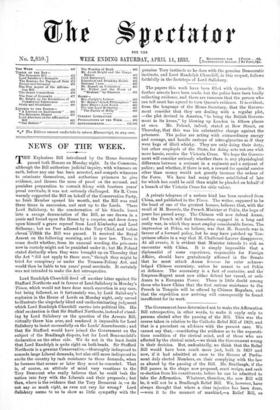NEWS OF THE WEEK.
THE Explosives Bill introduced by the Home Secretary passed both Houses on Monday night. In the Commons, although the Bill authorises judicial inquiry, with witnesses on .oath, before any one has been arrested, and compels witnesses to criminate themselves, and authorises prisoners to give evidence, and throws the onus of proof on the accused, and punishes preparation to commit felony with fourteen years' -penal servitude, it was not seriously challenged. Sir R. Cross warmly supported the Bill on behalf of the Conservative Party, no Irish Member opened his mouth, and the Bill was read 'three times in succession, and sent up to the Lords. There Lord Salisbury, to the consternation of his friends, burst into a savage denunciation of the Bill, as one drawn in a panic and forced upon the House by a surprise, and drew down upon himself a grave reproof from Lord Kimberley and Lord Selborne ; but no Peer adhered to the Tory Chief, and before eleven o'dIbk the Bill was passed. It received the Royal Assent on the following morning, and is now law. There is some doubt whether, from its unusual wording, the prisoners now in custody might not be punished under it ; but Mr. Poland stated distinctly when they were brought up on Thursday that the Act "did not apply to these men," though they might be tried for conspiracy or under the Treason-Felony Act, and -would then be liable to ten years' penal servitude. It certainly was not intended to make the Act retrospective.


































